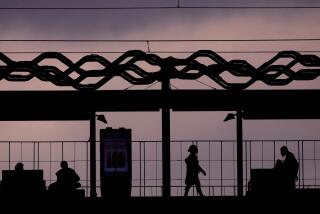Group Vows to Return to Stadium Anyway : Court Tells Graham Protesters Not to Pass Out Leaflets
After four hours and being shuffled from courtroom to courtroom Friday, several church members from Maryland lost their request to distribute literature outside the Anaheim Stadium during the Billy Graham Crusade.
Despite Orange County Superior Court Judge Everett W. Dickey’s ruling against the American Civil Liberties Union, which represented the Maryland men, members of the Church at White Hall, Md., vowed to return to Anaheim Stadium for the remaining days of the evangelist’s crusade, which ends Sunday.
“We’ll be out there more,” said Bernard Haygood Jr., who said he has been involved in about a dozen other cases as he has traveled around the country preaching his gospel and denouncing Graham. He and other members of his church contend in their leaflets that Graham preaches “a perverted gospel,” primarily because he preaches salvation based upon “faith only” without baptism. Haygood said he has been confronting Graham since 1953, when he began to pass out literature outside the Cotton Bowl in Dallas.
Two Arrested
Anaheim police arrested Haygood and fellow church member Mark Talbot Thursday night on suspicion of violating a city ordinance that bans solicitation or distribution of materials anywhere in the city where signs are posted forbidding such activity.
Despite the denial Friday of a temporary restraining order that would have prevented police from enforcing the ordinance, ACLU attorney Susan Borges said she plans to pursue the case during a hearing set for Sept. 19. Borges late Friday rejected a request by Anaheim Deputy City Atty. Charles Redd to set the case aside until the settlement of a pending lawsuit filed by the Hare Krishna organization regarding a city solicitation ordinance.
The attorneys spent much of the afternoon jumping from courtroom to courtroom in search of a judge.
The first person to hear the case, Superior Court Commissioner Ronald L. Bauer, said he was “not sure I came to this case with an open mind,” and explained that he was “going out tonight to watch the show” at the stadium. Bauer suggested that he be disqualified and Borges agreed.
Also Disqualified
The second judge, Robert J. Polis, was not to the liking of the attorneys representing Anaheim.
Polis agreed when Redd asked he be disqualified. “Mr. Redd knows that I have thumbed my nose at the federal judges” in a similar case, Polis said. Last year, Polis ruled that an Anaheim ordinance regarding solicitation was unconstitutional despite a federal ruling to the opposite.
With Bauer and Polis disqualified, a court clerk again hurried to a phone to find a judge available late Friday afternoon. Finally, Judge Dickey agreed to accept the case. He read the court documents inside his chamber, heard no oral arguments and had a clerk announce his decision in the courtroom.
Borges, while expressing disappointment at Dickey’s decision, said “the ACLU is interested in pursuing” the matter.
Calling the Anaheim ordinance unconstitutional, Borges said her clients’ free speech rights were violated by police.
She argued that the men have a right to distribute their literature on the ground that during the crusade, Anaheim Stadium is a public forum for the dissemination of religious information. Borges also argued that since the city was not charging rent for the stadium during the crusade and since it was a free event, it further constituted a public forum.
Redd, the attorney for the city, pointed to a 1983 ruling by U.S. District Court Chief Judge Manuel L. Real that the stadium was not a public forum and that the Hare Krishnas could be barred from soliciting there. Redd also said that while Graham was not charged for the stadium, he will be charged for stadium services. Redd contended that the stadium was a public place used for private commercial purposes.
After Dickey’s ruling, both sides went back to the original courtroom where Bauer scheduled the September hearing date for the preliminary injunction request.
With the date set, Haygood walked up to the city clerk and left Bauer some of his literature in case the judge “may not get one today.”
More to Read
Sign up for Essential California
The most important California stories and recommendations in your inbox every morning.
You may occasionally receive promotional content from the Los Angeles Times.










